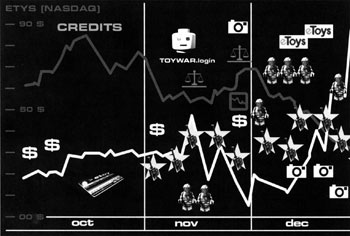![[Metroactive Arts]](/arts/gifs/art468.gif)
[ Arts Index | Silicon Valley | Metroactive Home | Archives ]

Net Wars: The Swiss artists known as Etoy kicked off a global art happening that affected corporate profits in 2000. Hacking Free Alex Galloway and Cory Arcangel mount an assault on the protocols that control digital information By Gary Singh WHEN Alex Galloway isn't hacking old video games on a Commodore 64--remember that computer?--he's quoting French poststructuralist philosopher Gilles Deleuze on how technology is social before it's technical. Or he's writing computer-surveillance tools for data networks inspired by FBI software. Or he's waxing poetic about decentralized networks, DNS protocol, Michel Foucault, William Gibson, CPU time and Marx--all in the same chapter. Galloway, now an assistant professor of media ecology at New York University, has been a fixture in the new-media art-and-technology milieu for probably a decade. For years, he was one of the heavyweights behind Rhizome.org, an online community of artists, hackers, programmers, writers, critics and new-media professionals of all shapes and sizes. Since 1996, Rhizome.org has multiplied--not risen, for that would imply verticality--into a global platform for the cross sections of art, high-tech and critical-theory factions everywhere. "Rhizome" is a figurative term used by Gilles Deleuze and Felix Guattari in A Thousand Plateaus, a philosophical tome that has become the theoretical bible for the new-media art-and-technology world. Crudely simplified, a rhizome is anything acentered and nonhierarchical, with no beginning or end. In other words, a smooth space, something that is all middle. It's like anti-genealogy or the opposite of tree roots. Much of Galloway's art projects and writings are inspired by Deleuze and Guattari. Cory Arcangel, a Brooklyn-based musician and computer artist, joins Galloway on Monday (May 10) at Broadcom in Sunnyvale for a live, real-time computer-game hack/performance with full-on audience participation. They will introduce work by the Low Level All Stars (LLAS), a selection of artists from around the globe who crack Commodore 64 computer games, followed by a reception for Galloway's Protocol: How Control Exists After Decentralization (MIT Press). The event is part of ZeroOne's HOTSPOTS, a rhizomatic series of discussions on burning topics in art and technology. The event is titled "A Video Game Saved My Life." Protocol itself is a book on computer science written by someone who's not a computer scientist, and that's a good thing. Like any interdisciplinary endeavor, the book proves that someone who's not an expert in a field can still contribute interesting research to that field. Galloway is yet another high-tech artist and cultural critic taking on our protocol-based society. Not that protocol (which Galloway defines as "the principle of organization native to computers in distributed networks) is inherently good or bad. It's just that "the technical is always political" and that "network architecture is politics. So protocol necessarily involves a complex interrelation of political questions, some progressive, some reactionary. In many ways, protocol is a dramatic move forward, but in other ways it reinstates systems of social and technical control that are deserving of critical analysis." When it comes to hacking video-game protocol through brute force, LLAS is at the forefront. Originally created for the Kingdom of Piracy online forum, it reiterates artistic acts of piracy as a strategy for intellectual discourse, but not as an endorsement of piracy as a business model. It represents low-tech poetic disruption at its finest: exploring the free sharing of digital content as an art form. The bureaucrats of rigid intellectual-property-rights enforcement are starting to feel the heat. Who thought an ancient personal computer that started up with "38911 basic bytes free" would be revived with such unruly glee? Which brings us back to the Commodore 64, nostalgia for which is currently raging. So exhume your Frogger chops and your 64K-RAM systems and hack away. Galloway and Arcangel will be hacking everything from Super Mario Brothers to newer games like Tony Hawk's Pro Skater 4.
A Video Game Saved My Life, May 10 at 7pm at Broadcom, 190 Mathilda Place, Sunnyvale. Free. (650.810.1057; michela@zero1.org)
Send a letter to the editor about this story to letters@metronews.com. [ Silicon Valley | Metroactive Home | Archives ]
|
From the May 5-11, 2004 issue of Metro, Silicon Valley's Weekly Newspaper.
Copyright © Metro Publishing Inc. Metroactive is affiliated with the Boulevards Network.
For more information about the San Jose/Silicon Valley area, visit sanjose.com.